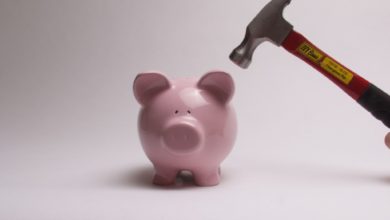No Spend Days: What’s The Point?
I’ve heard a few bloggers ask what the point of no spend days are. Why do we love them? Where’s the value in a no spend day if you just shuffle spending from day to day? Do no-spend days really help you save money, or do they transfer spending to a different day, rendering them useless?
I think no-spend days can help you save money, depending on what type of spender you are.
The Daily Spender
If you are like me and spend daily on lunch out and chocolate from a vending machine, a no spend challenge can be very beneficial. Some people challenge themselves to no spend days a few times a week.
For me, a no spend day challenge that challenges me not to spend any money for three of the seven days of the week would save me anywhere between $5-10 per day. Usually that’s $5 for lunch, followed by another $1-5 for parking (when I could just park farther away and walk) or a snack (usually chocolate).
But for arguments sake, lets just say it’s $5/day, meaning $15/week for the challenge I’ve outlined above.
After a month, assuming four weeks, I’d have saved about $60.
If I put that money, at $25, into my retirement account, by the time I was 65 and ready to retire, the no spend day savings from just the one month if I completed the challenge successfully would generate compound interest, leaving me with $288 – a 6x + return.
That’s pretty awesome. And that’s just one month.
If, as a daily spender, I challenged myself to 6 months of this – or every second month – that would increase significantly. Clearly, no spend days work for saving the daily spender money.

Why They Don’t Work
No spend day challenges will never work in saving people money if they don’t have a problem with little, unnecessary day-to-day purchases.
No spend days don’t work for people who push the purchases they’d normally make back just to have a no spend day. For instance, while I do love seeing the “no spend day!” on my spending report on Sunday, it doesn’t help anything if I just delay going to the grocery store or paying my phone bill one day because I want to see that.
Therefore, no spend days really only work for one or two kinds of spenders – the daily and the impulse spender (I’m both).
What kind of spender are you? Do you find that no spend days help you spend less, or do they just make you shuffle your spending around?





I can be an impulse spender, but I am not a daily spender. No spend days are not something I arrange, but they happen quite frequently for me because I rarely buy anything during the work week.
On the weekends, I loosen the purse strings a bit to get groceries and whatnot, but nothing really too outrageous.
I don’t really do no spend days (at least I’ve never tracked). I do think not spending can help because it can limit impulse buys while you’re out.
I find that having no spend days makes me more conscious of my spending. I have a tendancy to get a little lax especially if I have cash in my wallet. Forcing myself to do a no spend every once and a while gets me back on track.
No spend days work for me on food and that’s about all. I always have something to eat in my fridge, cupboards or freezer, even though on many days, none of it seems appetizing. On no spend days, I’d force myself to eat what I have. On days where I’m not so disciplined, I will go out and buy more groceries or go out to eat, leaving that food that’s perfectly acceptable at home to never get eaten. That’s money that I didn’t have to spend. Regarding getting toilet paper or hand soap, leaving that to go another day will just result in the money being spent on a later day (unless I somehow go without but that’s not realistic).
I don’t consider myself a daily spender, so I don’t worry about no spend days. Instead, I try to curb certain kinds of spending and purchases such as eating fast food and buying bottled water.
I don’t have planned “no spend” days. But most weekdays are no spend days for me because I’m so busy I don’t have time to buy anything. Weekends are when most of my spending happens and that’s usually just groceries and items I need.
I actually wrote a post on Moderator vs. Abstainers – and I think no-spend challenges or no-spend on(insert your vice of choice) challenges can be very successful for abstainers, but less successful for moderators. I’m a moderator, so I know that instead of saying NO lattes out ever, I’m much more likely to follow through my goal if I say I’m going to have FEWER lattes a week. That way I don’t feel like I’m depriving myself, but I still have a goal that’s I can succeed at.
Thanks for the nuance.
I don’t purchase little impulse items, so implementing no spend days wouldn’t change the overall amount of money I spend. It would just be an inconvenience. Actually I have tons of “no spend days” every week if you don’t count auto-payments.
I find no spend days to be useful in just alerting me to habits I maybe didn’t realize I had, but otherwise, I’m not a big fan. I mean, even if I went seven days without buying a coffee at Tim Horton’s, when my ban was over, I’d probably go back to it, because it’s something I like doing. I suppose it forces me to examine and be more intentional with my spending, which I guess is always a good thing.
Also? That dog is awesome.
I never consciously do the no-spend day thing, but I have no spend days fairly frequently. I could definitely see how it could help certain spenders though. Without that kind of goal, it’s far too easy to go spend money on things we just don’t need. You’re right that it just delays a lot of purchases, but in some cases that may give you time to evaluate if that purchase is worthwhile or not.
I’m not one for doing the no-spend days. Not that I’m against it or anything it’s just that it doesn’t work for me. If its something that I am going to purchase or need anyway it just doesn’t make sense to put it off.
What I do is try to cut stuff out of daily spending, like buying a snack or a pop. That’s like 2-3 bucks right there, which adds up over the course of a month. I try to build a habit of doing this not only because its unhealthy, but also because I could use that money elsewhere.
I was thinking the same thing. Only certain types of spenders would benefit from it. I’m going for 25 no spend days this month. I’ve never done it before so I’m curious what all the fuss is about and want to give it a try myself.
I think their value lies more in helping you change your behaviors than as a fix-it. Over time hopefully one will be more analytical about their purchases, and needs and wants.
I’m not a daily spender so “no-spend” days wouldn’t really work with me. But I think the concept is great for those that make little purchases every day & are trying to curb that habit.
I’m not a daily spender, so implementing no-spend days would just frustrate me. It’s easier to forbid a category — like when I was getting out of credit card debt, I didn’t allow myself to buy clothes or a hair cut.
I came to realize a while ago that I was part of the second group. The ones who would just shuffle. I am in no way what you would consider a daily spender or an impulse spender.
What I began to focus on after that was the total spent at the end of the week. This to me is the most important out of your spending report. So instead of trying to maximize no spend days, which a few came fairly easy. I started looking at how much I was spending weekly and why that amount was spent.
Awesome post Daisy.
I’m a daily and impulse spender as well. Sometimes I try to sneak around my no spend days by using cash (cash is free for all, can be spent on anything and doesn’t count because I rarely have it and probably earned it somehow) since I use my CC for everything.
In recent years, I had to implement a no-spend days policy, because I was one of those with a terrible spending problem. Personally, I think that no spends days can be helpful to anyone whether he/she is an impulsive spender or not. It’s just a question of each person’s individual financial goals that could be realized through exercising no spend days.
I’m with Skeptical Dog. I’ve tried to “not spend” on certain days and it just didn’t work. In fact, the longer I waited, the more I would spend when I finally did go spend money. Plus there is also the issue that my wife would literally explode.
I’ve done the no spend days. Sometimes it saves me money sometimes it doesn’t. It’s hard to tell if I’m a daily spender or not. Impulse spending however describes to a T.
Unfortunately, no spend days aren’t much of a help with my family now, however, I do believe it is a great way for someone to get in the routine of saving and making better decisions. Great post.
Jeremiah Brown
financeyoga@gmail.com
I have no spend days but have found if I don’t plan for them, that I tend to get more of them. I try not to impulse buy right now and that helps me out a ton. Normally when I’m out getting random things that are wanted or needed, I’ll try to remember to go ahead and get the milk that we need in a day just so I don’t have to make extra trips but that’s the extent of my planning.
I’ve also found no spend days only work if you actually save the money. Often people leave the cash they would have spent in their checking account and blow it later.
You hit it right on the head. I swing between being a fritterer and not being a fritterer. If I’m not frittering, I find that the no spend days just add up without me even thinking about it, so they don’t matter. I could easily have 10 no spend days in a two week period. When I am frittering though, counting those no spend days is extremely useful tool for getting my spending back under control.
No spend days work really great for me.
I almost had one yesterday but then I bought a latte at 8pm and was like DAMN IT.
See that’s $5 I could have kept if I had just been more committed to my no spend day. Why did I even buy a latte from that small coffee shop? I already had a Starbucks americano earlier in the day (bought with a gift card, so doesn’t count as “spending” since I already spent the money to load the gift card on a different day).
eff.
I’m exactly like you (surprise surprise haha) and I should always try to aim for no spend days. They make me feel accomplished – and I would save a lot if I would just throw the money into savings. During one week I ate lean cuisines all week and was so proud of myself for not going out to eat. It’s tough though when you have no time (or a kitchen in my case).
No spend days is like fasting as a solution for losing weight. You need to learn to eat healthfully versus just stop eating. Personal Finance is the same, you need to learn how to spend, save, invest etc to succeed with money.
I agree with Krantcents that no spend days are akin to fasting. As you’ve pointed out, key is not to over spend the day after the no spend day. It’s same as over eating right after fasting. You can save a lot by having “Rule of 72” on your side by developing this habit as early as possible in your life.
I definitely think that No Spend Days would help me. But I do not think I am ready for that kind of commitment yet (like it is a bad thing haha) so I will wait out until next month probably.
Based on my observations, picking up essentials like groceries every couple of days can lead to more frequent impulse buys and poor planning in general.
I find it much more effective to plan out weekly or biweekly meal plans and purchase most of it in one fell swoop, on the weekends. Weekdays then automatically become “no-spend-days” for me.
More planning and fewer purchases = less wasted food, fewer impulse buys and daily threats, better financial organization, and lower bank fees (if you pay by debit).
Treats, not threats; sorry.
I’ve been asking myself this question for so long!! I would definitely just shuffle my spending around a little to have a “no spend day”. At least this helped me figure out what kind of spender I am! Thanks for bringing up this topic!
I’m neither (http://eemusings.wordpress.com/2010/09/02/a-week-of-it-or-why-no-spend-days-arent-for-me/). But I can understand and respect those for whom it works.
I am an impulsive spender. I think I should give it a try for two months.I quite sure that I will be able to save a lot.
Here’s our readers on the topic: http://nicoleandmaggie.wordpress.com/2011/08/29/what-do-you-think-about-no-spend-days/
I can see no spend days working only if you are not spending on something that is a necessity. If you are putting off buying groceries until the next day, you really aren’t saving anything. If you are canceling a night out that you won’t make up for at some time in the future, you will save.
i have to agree with you for the most part, daisy. if you put off an expense for the next day– it really isn’t worth it.
the same goes for putting off an expenses at the end of the month just to keep your monthly “budget” below a certain threshold.
that said.. by striving for a “no spend day” you can perhaps dissuade yourself from buying something that you would have normally bought.
I don’t track things to a T like that anyway. I look at overall how much we’re spending in each category per month. Today was a “no spend day” so far, but nothing to be proud of or anything…because I did eat and use my car (food and gas) but just bought those items on a different day. 🙂
I never thought about it this way, but YOU ARE SO RIGHT!!!!!!
I inadvertently have no spend days. Like today: we went to the bank to make a deposit and the park to play. We do stuff like this a lot. I think our lifestyle just lends itself to running into a day once or twice a week where we don’t spend any money. So I couldn’t really speak to a challenge, though it would seem to me like you’re right in your conclusions.
Pushing purchases out past no-spend days is a bit like fasting during the week, and binging on the weekend. Not terribly effective.
I feel this way about those challenges that are all “10 days without spending ANYTHING” because then you can just prepare for it and do all your spending beforehand, and survive for ten days. Don’t get me wrong, not buying anything for ten days would be hard! I just don’t like the idea of preparing for no-spend scenarios.
I’m also an impulse spender and a daily spender, and sometimes I don’t even notice if I’ve had a no spend day or not. If I have, it’s likely because I’ve stayed inside all day or managed to bring my lunch and make my coffee at home – small victories!
I’m more of an impulse spender. I’ve learned to deal with it by making me wait a few days. If the urge is gone, then I don’t buy it. If the urge is still there, I question it some more.
I do agree with your reasoning. There is no point to not spend if you are simply shuffling the days you do spend around. It’s like the chain emails telling you not to buy gas tomorrow. OK, but that just means I’ll buy it the following day.